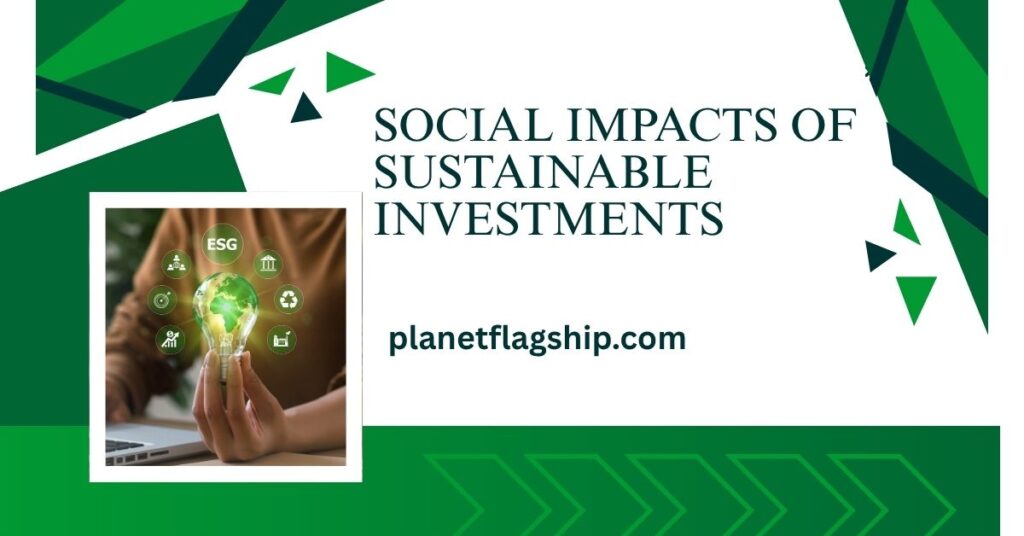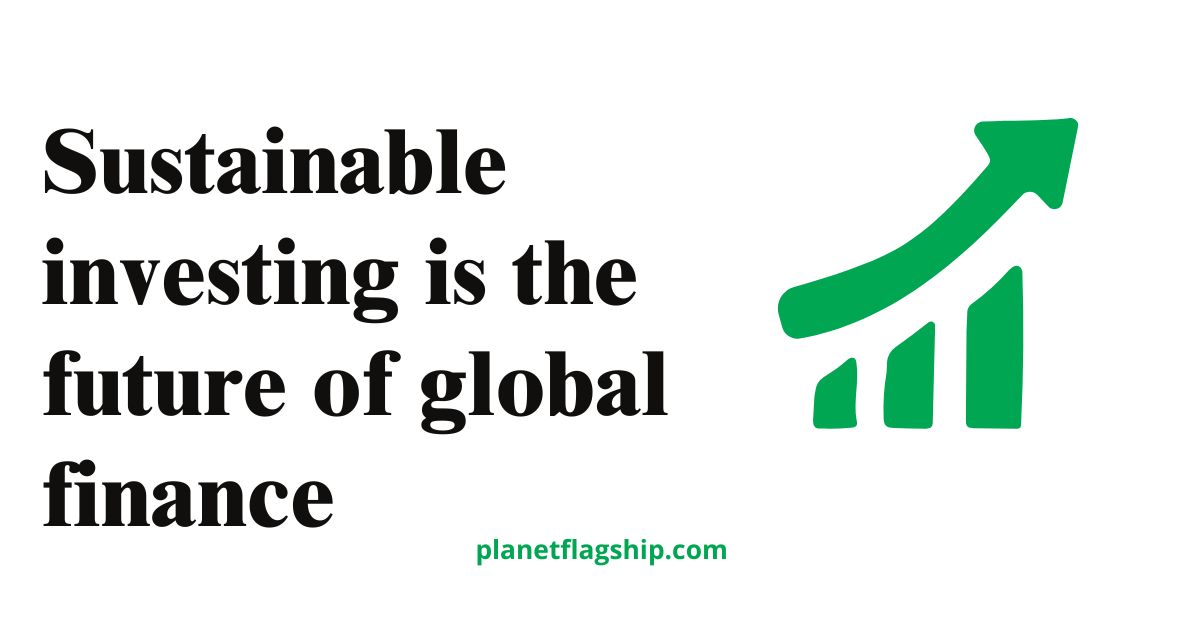Introduction
Sustainable investment is the art of achieving long-term performance, characterized by increased investor demand, technological advancements, and regulatory changes. Sustainable investing is the future of global finances, like policy support and regulatory changes, ethical considerations, economic benefits and long-term returns, and alignment with global sustainability goals such as combating climate change, fostering social inclusion, and maintaining environmental protection by investing in firms that are solving these issues, and investors may help to create a more sustainable future for all.
Sustainable investing is quickly becoming the smart way to generate long-term returns, with conventional investors scrambling to factor in issues such as climate change. Sustainable investing has already outperformed the mainstream, and concerned investors need to know how to best position themselves for potentially radical market change. Sustainable investing is important for finance because it creates a sustainable business that can deliver significant cost cuttings and efficiencies. Sustainability preserves natural resources like water and air for future generations and also preserves the planet. Sustainable ways of living can also protect the habitats of plants and animals, and they also reduce pollution.
Sustainable Investing
Sustainable investing, also known as socially responsible investing (SRI), environmental, social, and governance (ESG) investing, or impact investing, is becoming a mainstream investment approach. As climate change and environmental issues take center stage on the global agenda, the investment world is experiencing a shift. Sustainable investing is the practice of investing in companies, projects, and initiatives that adhere to environmental, social, and governance (ESG) standards. Instead of focusing exclusively on financial returns, sustainable investing considers a company’s environmental effect, employee treatment, and ethical practices.
Purpose and Importance
The purpose is twofold: first, to earn profits for investors; second, to promote ethical business practices that benefit society and the environment. The rising interest in sustainable investments reflects growing worries about climate change, inequality, and corporate governance. The future of sustainable investing is bright, as an increasing number of institutional and retail investors recognize the need to align their investments with their values. As the world faces new environmental and social challenges, sustainable investing is poised to become increasingly important in the financial sector. As more investors advocate for positive change, businesses will be motivated to embrace more sustainable practices, resulting in a cycle in which financial performance and social responsibility may coexist.
READ MORE: Human Cost of Climate Change: how it’s displacing millions of people?
Rise in Environmental Consciousness
The rise of sustainable investment is more than just a trend; it reflects a deeper shift in how we see wealth generation. By investing in firms that emphasize the environment, people, and governance, we not only secure greater financial returns but also contribute to a more sustainable and fair future for all. Sustainable investing is no longer a niche market; it is an expanding trend. Whether you’re a seasoned investor or just getting started in the world of finance, understanding how to make investments that represent both your financial goals and your ethical principles could be a profitable approach in the years ahead.
The growing awareness of climate change and environmental damage has prompted many investors to reassess where their money is being invested. Companies with poor environmental standards are becoming a burden, both in terms of regulatory risk and consumer preference. Many investors are now seeking companies that are committed to decreasing their carbon footprint, investing in clean energy, or implementing sustainable practices in their operations.
Growing Sense of Social Responsibility
Investors are growing increasingly concerned about social issues, including inequality, human rights, and working conditions. Many people are choosing to invest in firms that value diversity and inclusion, pay fair wages, and operate responsibly. This shift toward ethical investing is about more than just doing good; it is also about aligning investments with personal values, which is becoming increasingly essential to modern investors.
Financial Benefits of ESG-Focused Companies

Sustainable investing is also appealing because it is believed to yield long-term financial returns. Companies that prioritize ESG considerations are typically more robust and well-positioned for the future. Companies that focus on renewable energy, for example, may be better positioned to transition to a low-carbon economy. Similarly, companies with solid governance and ethical procedures are less likely to be embroiled in scandals or face legal challenges that could hurt their stock prices.
Government Incentives and Sustainability
In many areas, governments are starting to offer incentives for environmentally friendly corporate practices. Policies aiming at lowering carbon emissions, boosting renewable energy, and regulating ethical labor standards are encouraging businesses to take more responsible actions. These regulatory improvements not only enhance firms’ social and environmental impact but also attract investors seeking opportunities that align with global sustainability ideals.
The rising environmental crises underscore the need for sustainable finance concepts to mitigate both financial and environmental risks while driving our economy toward a more sustainable future. The financial industry is a tremendous motivator for long-term awareness and action. Because finance is nearly always required to address environmental and social issues, financial resources must be collected and utilized with sustainability objectives in mind. The primary objective of sustainable finance is to promote environmental sustainability, social well-being, and long-term financial stability.
Integrating ESG factors into financial strategy allows the finance sector to detect and manage the financial risks associated with unsustainable practices. These hazards could result in regulatory penalties, reputational damage, and costly cleaning expenses. Financial institutions can make significant contributions to biodiversity conservation, renewable energy development, and sustainable agriculture through targeted investments. By providing loans or issuing green bonds, they can support projects that provide significant environmental and social benefits while also yielding financial returns.
Social Impacts of Sustainable Investments

Sustainable investments help reduce poverty, increase health and well-being, promote inclusion, and enhance quality of life. When investors consider it in their financial decisions, organizations and sectors may prioritize creating a safe working environment. Investing in companies that encourage fair labor standards is not only humanitarian, but it also taps into the strength of common values. Businesses that adhere to ethical operational standards are committed to supporting their communities while attracting environmentally conscious customers and investors. This can lead to new market opportunities and drive other organizations to adopt similar best practices, resulting in a much-needed ripple effect that benefits everyone.
Sustainable finance emphasizes the critical necessity for nature-related financial disclosures. Businesses must be transparent and accountable for environmental hazards and their reliance on natural resources. Along with management ethics and compliance, sustainable finance promotes trustworthy and accountable leadership. Sound governance that recognizes, manages, and addresses risks can facilitate the transition to a more sustainable economy.
Sustainable finance is the financial decision-making process that includes environmental, social, and governance (ESG) considerations in investment plans. The need to address these issues stems from the recognition that standard financial models often overlook the long-term consequences of environmental degradation and social inequality. According to the United Nations Environment Programme (UNEP), “the financial sector plays an important role in solving global concerns such as climate change, biodiversity loss, and inequality.”
Frequently Asked Questions
What is sustainable investing and how does it work?
Sustainable investing means putting your money into companies that care about the environment, fair labor, and good governance. It balances profit with doing what’s right for people and the planet.
Is sustainable investing profitable in the long run?
Yes, many ESG-focused companies perform just as well or even better than traditional ones. They’re often more resilient and better prepared for future regulations and climate challenges.
Why are more people shifting toward sustainable finance?
Because today’s investors want returns and responsibility. People are looking for investments that reflect their values like clean energy, human rights, and ethical business practices.
How does sustainable investing help the environment and society?
It funds green energy, protects natural resources, promotes fair wages, and supports inclusive workplaces. Every dollar invested in ESG-forward companies helps build a better world.
What role do governments play in sustainable finance?
Governments support green investing through policies, incentives, and regulations that encourage businesses to go sustainable. These actions also attract ESG-focused investors and boost eco-innovation.
Conclusion
In conclusion, sustainable investing is more than a trend; it represents a fundamental shift in the way global finance is evolving. It responds to the growing demand for responsible investing, is aided by regulatory reforms and technical improvements, and eventually contributes to a more robust and sustainable global economy. Sustainable investing represents a fundamental shift in how we view finance and its role in society.
By incorporating these elements into investing decisions, we can achieve both financial success and excellent societal outcomes. Sustainable finance is the process of considering environmental, social, and governance (ESG) factors when making investment decisions in the financial sector, resulting in longer-term investments in sustainable economic activities and projects.

John is a professional blogger and passionate advocate for environmental sustainability. With years of experience exploring eco-friendly practices and green innovations, he shares insightful articles on Planet Flagship to inspire a sustainable future. John’s expertise lies in making complex environmental topics accessible and actionable, empowering readers to make meaningful changes for the planet.
